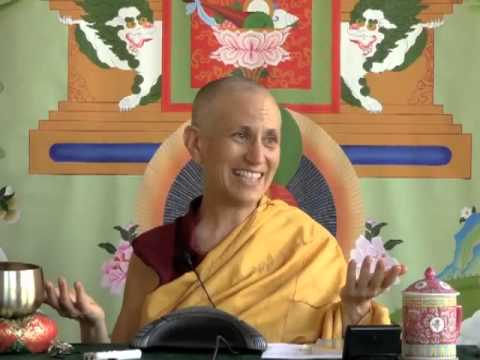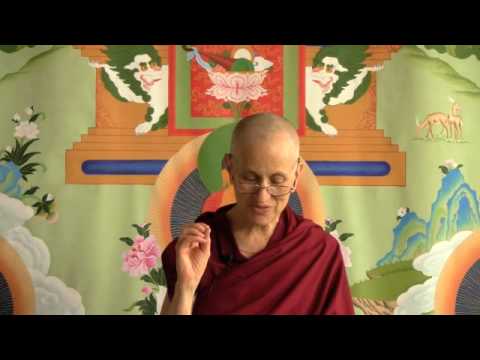Patience in developing serenity
Stages of the Path #130: The Fourth Noble Truth
Part of a series of Bodhisattva's Breakfast Corner talks on the Stages of the Path (or Lamrim) as described in the Guru Puja text by Panchen Lama I Lobsang Chokyi Gyaltsen.
- Cultivating the absorption factors along with serenity
- The importance of patience in cultivating concentration
- Being gentle with ourselves
As for doing the meditation to cultivate serenity we’re simultaneously cultivating these five absorption factors and subduing the five hindrances. The strengthening of the five factors kind of goes sequentially, because first when we’re meditating the coarse engagement is very important because that’s what really gets our mind on the object. Then once it’s there we cultivate the refined engagement. (Sometimes it’s translated as sustained engagement with the object.) From there a sense of rapture comes. Then that produces a sense of bliss. Then the mind gets very single-pointed and everything kind of coalesces on the object. So you develop the factors in that order, culminating in the single-pointedness.
It says that the five factors have to be patiently cultivated. We can’t push or will ourselves to gain concentration. This is something that many people don’t realize. Especially in a Western culture where we’re used to pushing, and we have this thing of, “If I just try hard enough, and I just will it, it’s going to happen.” That attitude doesn’t work in the case of meditation. Instead what happens is the mind gets quite fatigued and quite tight, and the opposite happens of what we want, which is that we get kind of tight, we get moody, we get stressed, and that isn’t conducive for good concentration. It’s quite a challenge for people in our culture to learn how to do something with “effort” but also with calm, because we always think of effort as effort like in sports, you just go in there, you’re the football player and you charge. But that approach which we’re so used to when we hear “effort” isn’t the meaning of effort when it comes to meditation practice. So we often have to learn this the hard way, by getting bumped around a lot until we learn that we can’t will or push ourselves into things. We have to learn how to work with the mind in a very, very skillful way. And skill is not something we’re used to. We so often rely on power in our lives. Through power we dominate or we get our way. But skill is a much more inviting technique and has better long-range benefits. And that skill applies not only to interpersonal relationships (rather than power over somebody), but also to how we act with ourselves, how we treat ourselves. If we’re like, “I’ve got to do this!” If we have an ability to be gentle with ourselves, and at the same time nudge ourselves along so that we don’t get complacent. That’s what’s really needed in cultivating these five factors. That kind of attitude.
It’s an overall attitude in our lives, isn’t it? That shows particularly in our meditation practice.
[In response to audience] The question is are things like coarse engagement and refined engagement, are they things we have now? Or are they things that we don’t have now that are created freshly?
They’re all things that we have now. They’re mental factors that we have now, but they’re underdeveloped. Or, because they’re changeable mental factors, we often put them on the wrong object. You know? Thus our ability to ruminate and dissect a harm somebody did to us. We have plenty of coarse and refined engagement for that. They’re mental factors that we have now but we have to steer them and cultivate them in a different way.
Venerable Thubten Chodron
Venerable Chodron emphasizes the practical application of Buddha’s teachings in our daily lives and is especially skilled at explaining them in ways easily understood and practiced by Westerners. She is well known for her warm, humorous, and lucid teachings. She was ordained as a Buddhist nun in 1977 by Kyabje Ling Rinpoche in Dharamsala, India, and in 1986 she received bhikshuni (full) ordination in Taiwan. Read her full bio.


